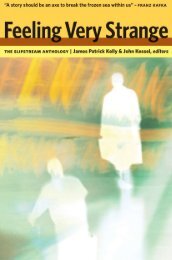The Curse of the Wer.. - Site de Thomas - Free
The Curse of the Wer.. - Site de Thomas - Free
The Curse of the Wer.. - Site de Thomas - Free
Create successful ePaper yourself
Turn your PDF publications into a flip-book with our unique Google optimized e-Paper software.
I USED TO BE A WEREWOLF<br />
burg’s effort to associate <strong>the</strong> Wolf-Man’s fear <strong>of</strong> wolves with a history<br />
<strong>of</strong> belief in werewolves is evi<strong>de</strong>nce <strong>of</strong> this, as are <strong>the</strong> various accounts<br />
<strong>of</strong> lycanthropy which inclu<strong>de</strong> a discussion <strong>of</strong> Freud’s Wolf-Man. 16 Even<br />
critics not directly concerned with werewolves have ma<strong>de</strong> <strong>the</strong> connection<br />
between <strong>the</strong> Wolf-Man and lycanthropy; as Whitney Davis argues<br />
in a work which re-examines <strong>the</strong> relationship between Freud and <strong>the</strong><br />
Wolf-Man, for example,<br />
We might even say that it was <strong>the</strong> Wolf Man’s psychoanalysis — not his<br />
Russian childhood — which turned him into a werewolf; this is certainly<br />
true at <strong>the</strong> most literal level, <strong>of</strong> course, to <strong>the</strong> extent that <strong>the</strong> text <strong>of</strong> <strong>the</strong><br />
case history … transformed a sophisticated, multilingual, wi<strong>de</strong>ly traveled<br />
twenty-four-year-old man into an infantile ‘Wolf Man’. 17<br />
Davis’s study implies that psychoanalytic technique has always been<br />
impregnated with myth, echoing Ginzburg’s observations on <strong>the</strong> wi<strong>de</strong>spread<br />
diffusion <strong>of</strong> myth in our culture, and o<strong>the</strong>r critics’ remarks<br />
about <strong>the</strong> use <strong>of</strong> Gothic imagery in psychoanalytic literature. 18<br />
As Ginzburg indicates, it would be pointless to attempt to explain<br />
<strong>the</strong> Wolf-Man’s neuroses in terms <strong>of</strong> lycanthropy. <strong>The</strong> problems <strong>of</strong> his<br />
adult life, even if <strong>the</strong>y did not stem from his acci<strong>de</strong>ntal or imagined<br />
childhood observation <strong>of</strong> <strong>the</strong> ‘primal scene’ <strong>of</strong> coitus between his<br />
parents (as Freud insisted), were not related to a fear <strong>of</strong>, or i<strong>de</strong>ntification<br />
with, wolves. Having said that, a sounding <strong>of</strong> Freud’s most famous<br />
case and <strong>the</strong> myth <strong>of</strong> lycanthropy produces a fascinating series <strong>of</strong><br />
echoes and reverberations between <strong>the</strong>se two different histories. Both<br />
<strong>the</strong> werewolf and <strong>the</strong> Wolf-Man whose life-story was so inextricably<br />
intertwined with <strong>the</strong> story <strong>of</strong> psychoanalysis 19 have much to tell us<br />
about <strong>the</strong> history <strong>of</strong> subjectivity, largely because both have embodied a<br />
very specific conceptualization <strong>of</strong> <strong>the</strong> human psyche as ‘divi<strong>de</strong>d against<br />
itself’ — or, as perpetually at war with <strong>the</strong> ‘beast within’. Moreover,<br />
both have shared in <strong>the</strong> elaboration <strong>of</strong> i<strong>de</strong>as about <strong>the</strong> experience<br />
and expression <strong>of</strong> masculinity, not least because <strong>the</strong> battle against<br />
<strong>the</strong> ‘beast within’ has been increasingly characterized as a peculiarly<br />
masculine problem.<br />
Freud is renowned for bringing a focus on gen<strong>de</strong>r to <strong>the</strong> study <strong>of</strong><br />
<strong>the</strong> self. Most significantly, he posited <strong>the</strong> coexistence <strong>of</strong> masculine<br />
69





